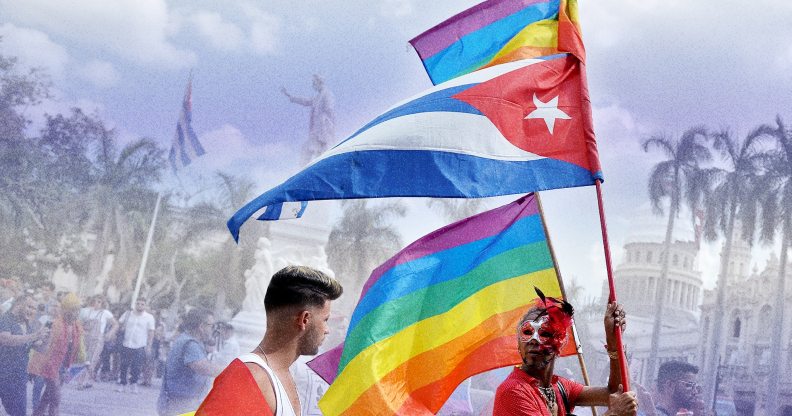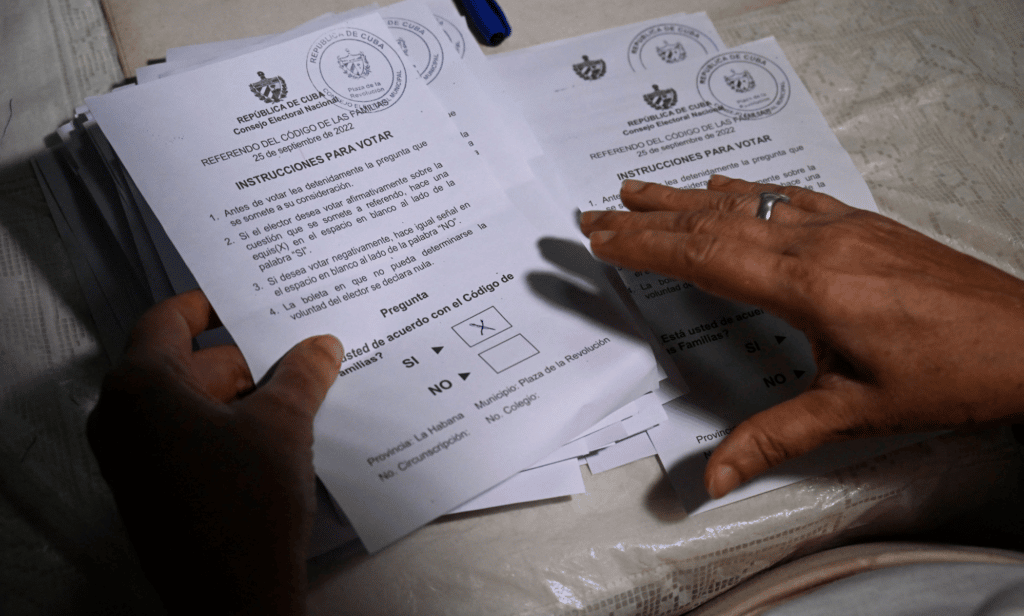Cuba just voted to legalise same-sex marriage and adoption for queer couples: ‘Love wins!’

The Cuban government urged its citizens to vote ‘yes’ on a broad legislative package, which will improve LGBTQ+ and women’s rights in the country. (Getty)
Cuba’s citizens have approved a broad family law code that will usher in same-sex marriage and other LGBTQ+ friendly measures in a historic vote.
Millions of Cubans turned out to vote for or against a major overhaul of the island country’s over four-decade-old family code. The package included the historic step of legalising same-sex marriage, allowing LGBTQ+ couples to adopt children and other progressive measures.
Campaigners said preliminary results indicated that the LGBTQ+ friendly package will be approved after millions voted in favour of the referendum on Sunday (25 September).
The Cuban national centre for sex education (CENESEX) – which has advocated for broadening LGBTQ+ rights in the country – wrote on Instagram that “love and affections won” after approximately 67 per cent of citizens voted in favour of the package.
Only 33 per cent of voters said they did not approve of the new family code, which contains more than 400 articles.
The president of the National Electoral Council, Alina Balseiro Gutiérrez, said voting returns from a few places remained to be counted.
But CENESEX considered the results to be “valid and irreversible” as a majority of voters approved the LGBTQ+ friendly package, ushering in the introduction of same-sex marriage in Cuba.
View this post on Instagram
Cuban president Miguel Díaz-Canel described the “joy” of preliminary counts saying the LGBTQ+ friendly family code will be approved had been tempered by the country preparing for hurricane Ian.
“With the joy of the first results of the referendum in favour of Code Yes , we enter a challenging week with hurricane Ian very close,” Díaz-Canel said. “Maximum protection of human lives and material resources. Let nothing fail. Overcome.”
Cuban minister of foreign affairs Bruno Rodríguez also welcomed approval of the new family code and measures legalising same-sex marriage, saying the country is now a “better” place” with “more rights”.
“Cuba has a new family code,” Rodríguez wrote. “Code Yes was the majority vote. Our people opted for a revolutionary, uplifting law that drives us to achieve social justice for which we work every day.”
He continued: “Today we are a better country, with more rights.”
Cuba tiene un nuevo #CódigoDeLasFamilias#CódigoSí fue el voto mayoritario. Nuestro pueblo apostó por una ley revolucionaria, enaltecedora, q nos impulsa a conquistar la justicia social por la q trabajamos cada día
Hoy somos un país mejor, con más derechos#ElAmorYaEsLey❤️🇨🇺 pic.twitter.com/rI2xIZCN1o— Bruno Rodríguez P (@BrunoRguezP) September 26, 2022
Members of the LGBTQ+ community in Cuba have waited decades for this momentous vote
Following the 1958 revolution, queer people were among those imprisoned and sent to forced labour camps alongside political dissidents of Fidel Castro’s new government.
Castro later apologised for the way the community was treated under his leadership, but the persecution of queer people has remained a sombre aspect of Cuba’s LGBTQ+ history.
Homosexuality was decriminalised in Cuba in 1979, but queer people still face discrimination in the country as they fought for broader rights for the community.

The new family code measure — which contains more than 400 articles — was approved by 67 per cent of Cuban voters. (Getty)
Cuban legislators abandoned provisions in 2018 that would have legalised same-sex marriage as the country voted to approve a new constitution. The move came after religious leaders mounted an intense campaign against the introduction of marriage equality for same-gender couples.
Police arrested several LGBTQ+ advocates participating in an unauthorised Pride march in the capital city of Havana in 2019. The march took place after the country’s 12th annual march against homophobia was abruptly cancelled.

